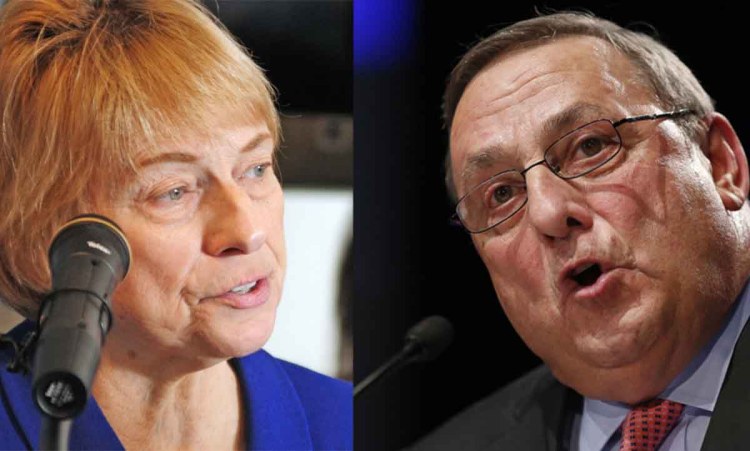AUGUSTA — Attorney General Janet Mills said a LePage administration proposal to divert timber harvesting revenue to a heating assistance program “would likely meet great skepticism” from the courts.
Writing to a task force that’s reviewing the management of Maine’s state-owned lands, Mills said it is impossible to reach “firm conclusions” about the constitutionality of Gov. Paul LePage’s plan and other proposals to siphon off timber revenues for other purposes.
But Mills said past opinions from the Maine Supreme Judicial Court and one of her predecessors make clear that there are limitations on the use of Maine’s public reserved lands, which are held “in trust” by the Legislature for residents.
“While the purchase of heating equipment for low-income rural families is a laudable goal, as is public assistance for food, shelter and health care, it is not easy to draw a connection between these types of uses and the preservation of the Public Reserved Lands,” Mills wrote to members of the Commission to Study the Public Reserved Lands Management Fund. “Under the very limited language of the Opinion of the Justices, this proposed use would likely meet great skepticism from the Court.”
LePage has proposed increasing timber harvesting on the lands – which are separate and distinct from state parks – to provide as much as $5 million a year to a program to help elderly and low-income Mainers heat their homes. He is also trying to use funding for the Land for Maine’s Future program as political leverage with lawmakers on the timber revenue plan.
Mills also wrote that diverting logging revenues from the Public Reserved Lands Management Fund to help cover costs in the state park system would likely not be permitted because it would displace general fund revenue. But the attorney general said using those trust funds to buy additional land “would have a decent chance to pass constitutional muster.”
Sen. Tom Saviello, the Republican from Wilton who co-chairs the commission, said he believes Mills’ letter “takes off the table” the proposals to use timber revenue for home heating or to assist state parks.
“It is guidance but it is pretty strong guidance,” Saviello said, adding that he would hate to fight the issue in court.
State law requires that logging revenue from state-owned lands be reinvested in the program, whether for staff salaries in the Bureau of Public Lands or improving public access to the land for recreation. During its September meeting, the commission was told that the Public Reserved Lands Management Fund has a balance of $7 million but that the state should keep $2.5 million set aside at any given time to cover expenses.
Adrienne Bennett, spokeswoman for LePage, pointed to that unspent balance in a statement Tuesday. “The governor and many others believe it is better to spend this money to help the needy than to simply let the funds sit in this account,” she said. “If someone wants to stand on principle rather than help Mainers who are struggling to stay warm during the winter, let them challenge this in court.”
Bennett said it “flies in the face of one of the essential roles of government” to argue that using the funds to help needy people heat their homes doesn’t provide public benefits called for in the trust limitations on the funds.
The state manages 418,000 acres of Maine’s 600,000 acres of public reserved lands for timber as well as for recreation and wildlife. Since LePage took office in 2011, timber harvests on state-owned lands have increased by more than 34 percent, from 115,167 cords to 155,152 cords last year.
Maine Forest Service director Doug Denico and other LePage administration officials have argued that some of Maine’s public timberlands are actually overstocked with wood – a risky situation with another spruce budworm epidemic potentially looming – and that increasing the annual harvest to 180,000 would result in healthier forests while increasing revenue.
The commission met Tuesday in Augusta as part of its effort to craft recommendations to the Legislature on proper use of logging funds, sustainable harvest levels and how best to manage the public lots for recreation, wildlife and timber. Meanwhile, members of the Land for Maine’s Future board met elsewhere in Augusta to continue debating how to move forward with the program in the face of LePage’s refusal to issue new bonds.
LePage administration officials said Tuesday that the governor is willing to release $2.2 million in “cash on hand” for Land for Maine’s Future but that he still does not support issuing additional bonds for the program. LePage’s decision to free up some of the previously frozen money was greeted as a step in the right direction by some board members but will not allow the program to fund all of the projects already approved by the board.
Send questions/comments to the editors.




Success. Please wait for the page to reload. If the page does not reload within 5 seconds, please refresh the page.
Enter your email and password to access comments.
Hi, to comment on stories you must . This profile is in addition to your subscription and website login.
Already have a commenting profile? .
Invalid username/password.
Please check your email to confirm and complete your registration.
Only subscribers are eligible to post comments. Please subscribe or login first for digital access. Here’s why.
Use the form below to reset your password. When you've submitted your account email, we will send an email with a reset code.